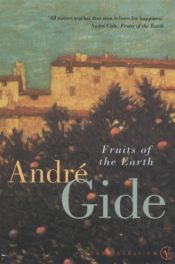Jordens frugter
Blurb
The Fruits of the Earth is a prose-poem by André Gide, published in France in 1897.The book was written in 1895 and appeared in a review in 1896 before publication the next year. Gide admitted to the intellectual influence of Nietzsche's Also Sprach Zarathustra but the true genesis was the author's own journey from the deforming influence of his puritanical religious upbringing to liberation in the arms of North African boys. Andre Maurois draws attention to the similarity of moral outlook between the two works in these words: "Like Thus Spake Zarathustra, Les Nourritures Terrestres is a gospel in the root sense of the word: glad tidings. Tidings about the meaning of life addressed to a dearly loved disciple whom Gide calls Nathanael." "Nathaniel" comes from the Hebrew name נְתַנְאֵל, "Nethan'el", meaning "God has given".
The book has three characters: the narrator, the narrator's teacher, Menalque, and the young Nathanael. Menalque has two lessons to impart through the narrator. The first is to flee families, rules, stability. Gide himself suffered so much from "snug homes" that he harped on its dangers all his life.

 English
English Español
Español Deutsch
Deutsch










Member Reviews Write your own review
Be the first person to review
Log in to comment